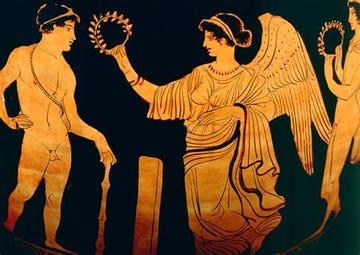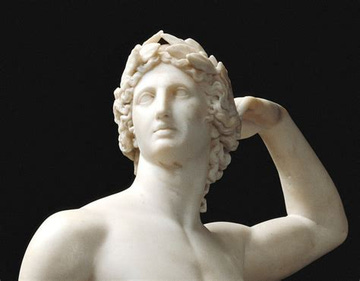What do you mean the Ancient Olympics didn’t hand out medals to its champions?
Why an Olive Wreath?
Wait a second, didn't athletes receive fame, riches, and more for winning at Ancient Greece's most important athletic contest?
Yes, but those didn't come from the Olympics themselves.
Each competitior's home city showered the athletes with material prizes. But the Olympic officials only gave out one material trophy, a natural olive wreath.
The Importance of Temporary Achievement
The olive crown wilted within a day, by the time the athletes returned to their home cities they had no physical commemoration of their championship exploits.
The ancient Greeks competed in sport to attain virtue and realize moments of human perfection that helped them reach the gods. But humans aren't perfect and any time we approach perfection we fall back down to earth. When an athlete triumphs physically they entered into the realm of the gods for a brief moment of transcendence.
We have this today in our sporting culture.
It's the moment you leap to your feet and scream in excitement when you witness an unforgettable moment in sports.
That play
That goal
That shot
That save
That run
THAT MOMENT
But it's over almost as soon as it happens.
You've felt it as well if you've played sports when everything goes your way and you make that once in a lifetime play. It's not something that last forever but is painfully fleeting.
The temporary crown represents the temporary attainment of perfection.
But it's also a symbol of the athlete's journey. The Ancient Greeks defined their society by Agon (the contest).
They LOVED to compete in everything. It was never good enough to just win one time. That didn't prove anything.
Win or lose each athlete returns to the next contest with a blank slate, redemption for the loser and succession for the winner.
Athletic pursuit isn't about the outcome but about the process. Training, sacrificing, struggling, achieving.
You aren't owed anything
You aren't guaranteed anything
You only have your effort and talent to rely on
When you win once, train harder and come back and repeat.
It reflects this famous Aristotle quote:
“We are what we repeatedly do. Excellence, then, is not an act, but a habit.”
The temporary achievement of athletic success only means something when strung together in succession with training, growth, and overcoming adversity.
That's why the Greeks only received a temporary trophy for winning.
How to apply in your own life?
The takeaway lesson is clear.
Don't rely on outcome to motivate your desire for achievement.
That's a motivation that, just like the athletic success you achieve, is temporary. Instead throw yourself into the process of using struggle and sacrifice for personal growth.
In terms of competition that means using each contest as a progression metric instead of a desired end goal. Your aim should be consistent improvement in body, mind, and spirit.
You'll NEVER be a perfect person, their is no end goal to personal development. But you can always improve if you don't let your past achievements define your present standard.
That’s how you should understand the role of athletic competition in your life.




